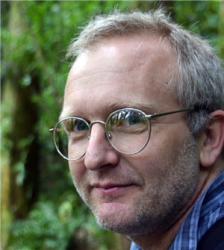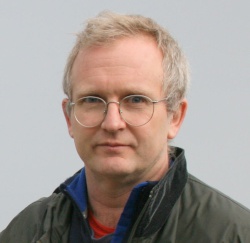Why I Am Standing For The InternetNZ Council | 500 Words
EXPLANATORY NOTE: I have
been nominated by Catalyst IT's Don Christie to stand for
election to serve as an Internet NZ councillor. Following
below is an election statement in support of my candidacy as
published on the Internet NZ website.
You can read
election statements for all eight candidates both on the
InternetNZ website and here
on Scoop.co.nz.
Online voting at for the election of
four Internet Councillors for a term of three years opens on
the 24th of June and closes on Saturday 6th of July. Members
of Internet NZ are eligible to vote. However please note
that if you join InternetNZ now you will not be able to
vote in this year's election.

The writer and Internet Council nominee Alastair Thompson
Dear Internet NZ Members,
Why I Am Standing For Internet NZ Council
My vision for the Internet is for it to continue to remain at least as open, accessible, innovative and transformative as it has to date. However I would like to see governance step up a gear and become more globally networked and responsive to the challenges being thrown up by a new significant wave of technological change.
The Internet everywhere stands at something of a crossroads thanks to the advent of ubiquitous mobile super-computing. I believe I have the experience to help guide New Zealand's contribution to charting the path ahead.
Chapter Two In The Personal Computing Revolution Is Beginning
33 years ago in 1980 Christchurch, circa Stubbies and HQ Holdens, my father Stephen Thompson who worked for the DSIR brought home an Altos 64. Several years pre IBM-PC it was one of the first ever commercial personal computers. It had an 8 inch floppy disk drive and 64kb of RAM memory (Total. To run the full stack - swapping to disk was vital). Aged 11 I taught this computer to play a Star Trek game by typing in several thousand lines of code from a magazine.
I recount this experience back then we were at the beginning of the personal computing revolution.
We are now at the beginning of a new chapter. Smartphones are not just phones - and nor are they computers - they are something new.
They are fast becoming pocketable super-computers which connect us - via the internet - to super-computers of scale in the cloud. It seems likely that soon we will be able to talk to them and they may even become capable of at least pretending to be sentient.
What Happens Next Will Be By Definition Unpredictable…
Bell's law teaches us that new technologies don't even start to crystalise for 10 years ( HT: Webstock 2013). Usually it takes us at least that long for us to even name a new kind of technology.
The iPhone is now seven years old. Three years ago low voltage mobile CPU processor sales caught up with PC and server architecture processor sales. Mobile is now substantially ahead of them.
And thanks to the magic of Multicore Processing (HT: Multicore World 2013) the throttle of innovation is back wide open. Multicore+Mobile offers the prospect of lower power consumption (i.e. longer battery life) and exponentially faster computing power everywhere.
What this means is that much of the current technology architecture that underlies what the ICT industry is working with is now obsolete. And so we stand at the edge of a period of technological change, innovation and opportunity unlike anything seen before.
… And The Legal And Political Structures Are Showing The Strain
But the legal, social and business infrastructure of New Zealand and the world are ill-prepared to understand or navigate the complex issues we now collectively and globally face.
Copyright, surveillance, privacy, accessibility, robotics, computing security, cyber-warfare, policing the social universe - these are some of the challenges we all know we need to address and which we will soon be discussing at Nethui.
The reality is that the NZ Parliament cannot govern the internet, either in NZ or anywhere else. Nor can any other single nation's legislature, the pace of change is too fast for the law to keep up and has been for years. And so we all need the internet to continue to govern itself - and to get better at doing so.
Peronally I am delighted that NZ's internet users are represented in these discussions and negotiations by Internet NZ. Prudent governance of Internet NZ over the past two decades means we have a strong organisation which should be able to respond well to the challenges it faces.
I Think I Have Relevant Experience And Knowledge To Help At This Time
Recent revelations about the NSA's PRISM programme are news to many but not everybody. Scoop.co.nz has been reporting on the rise of such global surveillance since these projects were first conceived in the wake of 9/11. The details and names we now see "PRISM" and "Boundless Informant" are what many thought was happening. Now we have proof. But what should we do about it?
As a practitioner in the world of online news media I have a decade and a half of experience in dealing with the challenges in a market being disrupted by technology.
As a news editor and publisher of NZ's leading independent online news service I have an array of connections and access to decision makers and stakeholders.
And as an NZ entrepreneur I understand the particular challenges and dangers posed to businesses in NZ by uninformed change, capricious decision making and the scale of NZ's markets.
I believe this experience will be useful in representing the interests of Internet NZ members at council.
Finally I have chosen to stand for Internet NZ council now because it is a time of significant challenge and change both externally and internally.
During the period ahead Internet NZ is likely to need to step up its game.
We will soon have a new chief executive and then it will be time for Council to consider setting a new course for the organisation. I would welcome an opportunity to contribute to plotting this course. Please support me by voting for me to join the Internet NZ Council.
Who
I Am
• Virtual me - @althecat | Google+ | Linked In
• 44 years old, with
three grown up children, living in Wellington;
• An
internet entrepreneur in business online continuously since
1997;
• A business and politics journalist by
background, and a member of the Parliamentary Press Gallery
since 1993;
• Founder of Scoop.co.nz in 1999 and General Manager
and editor ever since, managing both business development
and online editorial direction;
• Member of NZ Rise and
alumni of Kiwifoo and Telecom One;
• Instigator of the
Scoop Foundation Project an effort to launch a new
foundation in NZ for public Interest
Journalism;
• Experienced in online news media, social
media, community engagement, government engagement, online
marketing and communications;
Scoop and its Scoop Media Cartel sponsored Nethui in 2011 and 2012 and is sponsoring Nethui again in 2013.
Alastair Thompson
10 June
2013
(BACKGROUND NOTE ON SCOOP: Scoop.co.nz is New Zealand's leading independent online news provider with an audience of 500,000+ unique visitors monthly. Scoop publishes around 200 items of news each day - and is -according to media commentator Russell Brown- "The Home of the National Argument". For 14 years we have remained committed to providing open access to information in the interests of better informing New Zealand democracy. Scoop is also the hub for the Scoop Media Cartel which reaches 600,000+ unique visitors monthly and includes several of New Zealand's leading blogs.)
- Alastair Thompson | 500 Words
for Monday, June 24,
2013



 Ian Powell: From Thriving To Surviving - ‘Poster Child’ General Practice Struggle Symbolises Primary Care Crisis
Ian Powell: From Thriving To Surviving - ‘Poster Child’ General Practice Struggle Symbolises Primary Care Crisis Ramzy Baroud: Criminalizing UNRWA - How Israel Is Delegitimizing The United Nations
Ramzy Baroud: Criminalizing UNRWA - How Israel Is Delegitimizing The United Nations Binoy Kampmark: The Price Of Eggs - Why Harris Lost To Trump
Binoy Kampmark: The Price Of Eggs - Why Harris Lost To Trump Martin LeFevre - Meditations: The Triumph Of The Swill
Martin LeFevre - Meditations: The Triumph Of The Swill Gordon Campbell: On US Voter Suppression, Plus The Races To Watch
Gordon Campbell: On US Voter Suppression, Plus The Races To Watch Ian Powell: Fast-Tracking Wealth Accumulation And The War On Nature
Ian Powell: Fast-Tracking Wealth Accumulation And The War On Nature